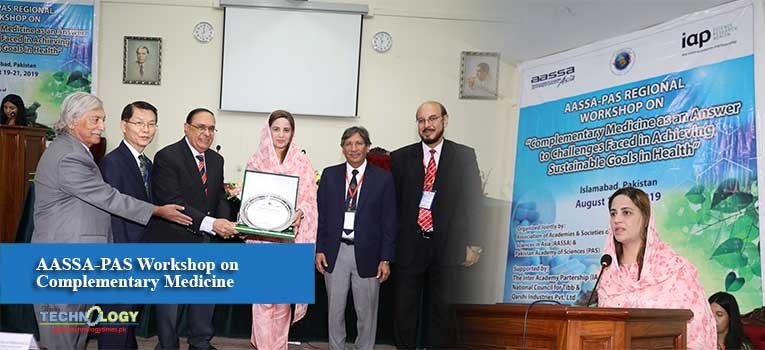The workshop AASSA-PAS Workshop on Complementary Medicine was inaugurated by Ms. Zartaj Gul Wazir and presentations were given by Prof. Zabta Shinwari (President National Council for Tibb).

Science is the foundation of economy. Various successive governments of Pakistan tried to formulate policies to transform agrarian economy to knowledge economy but failed.
Inspired by historical recommendations of the 1965 Meeting of eminent scientists of that time in Swat, chaired by President Ayub Khan, the Pakistan Academy of Sciences is persuading the present government to embark on this journey sincerely. The Meeting in Swat, organized jointly by Pakistan Academy of Sciences and National Science Council, had made 20 recommendations for the development of S&T, including a salient recommendation of allocating 2% of GDP for S&T in the federal budget.
After a lapse of 54 years, in 2019 it was noted with a serious concern that most of those recommendations were not heeded to till today, resulting in deplorable state of S&T and, hence, of the national economy.
The leading experts believe that investing upto 3.5% of GDP in science, technology and innovation can be “the game changer” to help alleviate poverty, reduce inequalities, increase income and improve health. Therefore, the top scientists of the country observed with serious concern that a meager allocation of 0.2% of GDP for S&T in the federal budget has resulted in deplorable state of S&T.
To improve upon this situation, it was unanimously urged that at least those areas be explored that does not need financial resources but a will to fight mafias. One such example is traditional knowledge of complementary medicine that can not only save resources by providing cheaper treatment but can be a major source of foreign exchange earnings.
Foreign experts from 7 countries of Asia & Central Asia (i.e., Indonesia, Korea, Malaysia, Nepal, Sri Lanka, Tajikistan, and Vietnam) as well as Pakistan presented their research in this regards.
The top scientists also recommended to launch an effective media campaign to educate the public and decision makers about salient achievements of scientific organizations and thus about the crucial need and benefits from these herbal resources in which Pakistan is probably richest.
The Meeting also urged the Government to always appoint eminent scientists as Federal Secretary of Ministry of Science & Technology, health and agriculture instead of a bureaucrat and reviving the National Science Council which has got redundant since the past 50 years. The scientists urged the government to use science for policy making in all fields ministries.
The workshop AASSA-PAS Workshop on Complementary Medicine was inaugurated by Ms. Zartaj Gul Wazir and presentations were given by Prof. Zabta Shinwari (President National Council for Tibb); President of Pakistan Academy of Sciences (PAS), Dr. Qasim Jan beside Academician Prof. Dato’ Dr. Khairul Anuar Bin Abdullah; Malaysia; Prof. Zuopeng LI; China; Dr. Deegendra Khadka, Nepal and Prof. Dr. Yoo Hong Kim from Korea.
The speakers stressed that in the world annual growth rate of herbal medicine is 5% while allopathy is 3%, hence there is a huge opportunity to use this discipline not only to treat ailing humanity but at the same time earn hard currency. The new Herbals & Naturals report found that 9 markets (Australia, Brazil, Canada, China, Germany, India, Italy, Japan, and USA) together added US$1,564mn in net sales in 2017, with China and USA the largest contributors.
- Probiotics form the single fastest-growing category among Herbals & Naturals (averaging +11% a year since 2013).
- Other growth areas include herbal & natural cough remedies (averaging +8% growth a year) and topical analgesics (+7% a year). Herbal & natural cough is enjoying a surge in demand, helped by safety concerns over allopathic options and restrictions placed on certain ingredients (DXM, codeine); plenty of launch activity, with ivy extract thyme and honey the key growth segments.
- Menthol and camphor are common and popular ingredients, alongside methyl salicylate, comfrey, capsaicin and arnica. China is dominated by TCMs, Pakistan by Unani, India by Ayurvedic remedies, while homeopathics are significant in Europe and USA.
- While obesity levels continue to rise, poverty as well as greed must take some of the blame:
- It’s not just overeating, but not having enough money to buy the right sorts of food.
- Since 2006, deaths from ischaemic (coronary) heart disease have increased by 19% globally.
- Diabetes caused 1.43 million deaths in 2016, an increase of 31.1% since 2006.
- Diabetes rose from the 17th to the 9th leading cause of death in low-middle income countries.